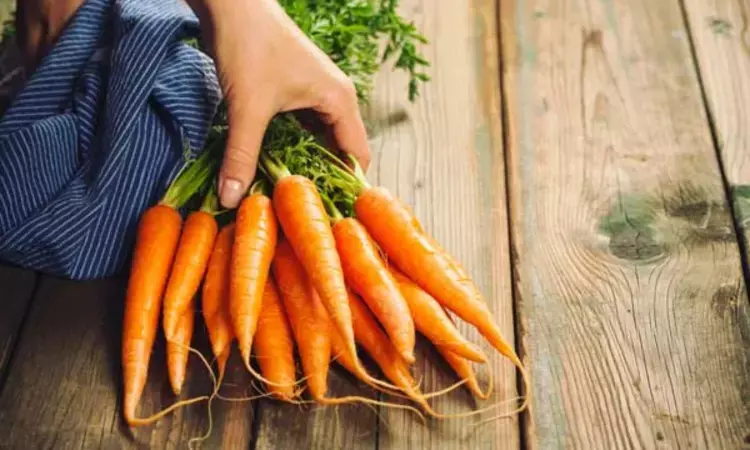- Home
- Medical news & Guidelines
- Anesthesiology
- Cardiology and CTVS
- Critical Care
- Dentistry
- Dermatology
- Diabetes and Endocrinology
- ENT
- Gastroenterology
- Medicine
- Nephrology
- Neurology
- Obstretics-Gynaecology
- Oncology
- Ophthalmology
- Orthopaedics
- Pediatrics-Neonatology
- Psychiatry
- Pulmonology
- Radiology
- Surgery
- Urology
- Laboratory Medicine
- Diet
- Nursing
- Paramedical
- Physiotherapy
- Health news
- Fact Check
- Bone Health Fact Check
- Brain Health Fact Check
- Cancer Related Fact Check
- Child Care Fact Check
- Dental and oral health fact check
- Diabetes and metabolic health fact check
- Diet and Nutrition Fact Check
- Eye and ENT Care Fact Check
- Fitness fact check
- Gut health fact check
- Heart health fact check
- Kidney health fact check
- Medical education fact check
- Men's health fact check
- Respiratory fact check
- Skin and hair care fact check
- Vaccine and Immunization fact check
- Women's health fact check
- AYUSH
- State News
- Andaman and Nicobar Islands
- Andhra Pradesh
- Arunachal Pradesh
- Assam
- Bihar
- Chandigarh
- Chattisgarh
- Dadra and Nagar Haveli
- Daman and Diu
- Delhi
- Goa
- Gujarat
- Haryana
- Himachal Pradesh
- Jammu & Kashmir
- Jharkhand
- Karnataka
- Kerala
- Ladakh
- Lakshadweep
- Madhya Pradesh
- Maharashtra
- Manipur
- Meghalaya
- Mizoram
- Nagaland
- Odisha
- Puducherry
- Punjab
- Rajasthan
- Sikkim
- Tamil Nadu
- Telangana
- Tripura
- Uttar Pradesh
- Uttrakhand
- West Bengal
- Medical Education
- Industry
Trying to eat more vegetables? Snacking on carrots might help

A new study found that eating a snack of baby carrots just three times a week significantly increased skin carotenoids in young adults. Levels of these phytonutrients were boosted even more when this healthy snack was combined with a multivitamin containing the carotenoid beta carotene.
Carotenoids, which are responsible for the bright red, orange and yellow colors of many fruits and vegetables, can be measured in the skin to gauge fruit and vegetable consumption since diet is the only source of these pigments. Higher levels of skin carotenoids are associated with increased antioxidant protection and a lower risk of chronic diseases such as heart disease and certain cancers. This marker also reflects improved skin health and immune function.
“Previous studies have demonstrated that skin carotenoid levels can be increased by consuming three times the recommended serving of fruits and vegetables every day for three weeks,” said Mary Harper Simmons, a Master of Science in Nutrition student at Samford University. “Our findings suggest that a small, simple dietary modification — incorporating baby carrots as a snack — can significantly increase skin carotenoid accumulation.”
Simmons will present the findings at NUTRITION 2024, the flagship annual meeting of the American Society for Nutrition held June 29–July 2 in Chicago.
For the study, the researchers randomly assigned 60 young adults to groups that received a four-week intervention of either Granny Smith apple slices (control), 100 grams (about half a cup) of baby carrots, a multivitamin supplement containing beta carotene or a combination of baby carrots and the supplement. Before and after the intervention, they used a noninvasive research-grade spectroscopy instrument called a VeggieMeter to detect and quantify carotenoids in the skin of the study participants.
The researchers found that compared to pre-intervention levels, skin carotenoid scores were significantly increased by 10.8% in the group receiving the baby carrots and by 21.6% in the group receiving the carrots and the supplement. Skin carotenoid levels were not changed in the control group or in those receiving only the supplement.
“We found that the combination of baby carrots and a multivitamin supplement that contains beta carotene can have an interactive effect on skin carotenoid accumulation,” said Simmons. “To get a beneficial effect, people should choose a multivitamin that contains beta carotene, and remember to eat baby carrots at least three times a week.”
Since carotenoid accumulation was not increased by multivitamin supplementation alone there could be differences in how carotenoids are absorbed, depending on whether they are from food or supplements. The researchers would like to explore the mechanism behind these findings and study the effects of other carotenoid-rich foods, such as sweet potato or green leafy vegetables.
Reference:
Trying to eat more vegetables? Snacking on carrots might help, American Society for Nutrition, Meeting: NUTRITION 2024
Dr Kamal Kant Kohli-MBBS, DTCD- a chest specialist with more than 30 years of practice and a flair for writing clinical articles, Dr Kamal Kant Kohli joined Medical Dialogues as a Chief Editor of Medical News. Besides writing articles, as an editor, he proofreads and verifies all the medical content published on Medical Dialogues including those coming from journals, studies,medical conferences,guidelines etc. Email: drkohli@medicaldialogues.in. Contact no. 011-43720751


